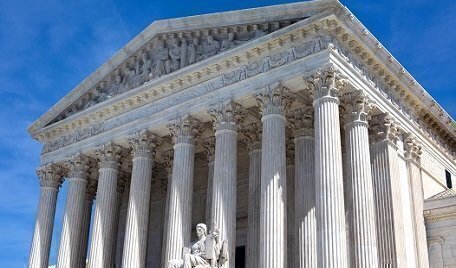A divided Supreme Court said on Tuesday that for now immigrants detained by U.S. customs officials don’t have a right to periodic bond hearings, returning the question to a federal appeals court.
 Justice Samuel Alito wrote most of the majority opinion in a case that was argued twice in front of the Justices. The Court’s conservatives joined the majority decision released on Tuesday, while Justice Sonia Sotomayor concurred in part with the majority and joined a dissent written by Justice Stephen Breyer, also joined.
Justice Samuel Alito wrote most of the majority opinion in a case that was argued twice in front of the Justices. The Court’s conservatives joined the majority decision released on Tuesday, while Justice Sonia Sotomayor concurred in part with the majority and joined a dissent written by Justice Stephen Breyer, also joined.
The case was first argued on November 30, 2016 at the Court. Soon after, the Justices asked to parties to submit new briefs. In July 2017, the Court said a date for new arguments in October 2017. Justice Elena Kagan also didn’t take part in the final decision.
In Jennings v. Rodriguez, the Court considered if immigrants who are legally detained by government officials should qualify for a bail hearing. There wasn’t a clear consensus of how the Court would act after arguments, some Supreme Court observers had said.
Today’s decision sends the case back to the Ninth Circuit Court of Appeals. Alito said that the Supreme Court had jurisdictional rights to consider the case, and that the Ninth Circuit had wrongly used a concept called constitutional avoidance in its original decision.
“The canon of constitutional avoidance ‘comes into play only when, after the application of ordinary textual analysis, the statute is found to be susceptible of more than one construction,’” Alito said. “In the absence of more than one plausible construction, the canon simply ‘has no application,’” he noted, citing legal precedents.
“The Court of Appeals misapplied the canon in this case because its interpretations of the three provisions at issue here are implausible,” Alito concluded.
The defendants also raised Fifth Amendment and due process issues that weren’t considered in the decision. “Because the Court of Appeals erroneously concluded that periodic bond hearings are required under the immigration provisions at issue here, it had no occasion to consider respondents’ constitutional arguments on their merits,” Alito said.
Justice Clarence Thomas concurred with the opinion but believed the Court didn’t have jurisdiction to hear the case.
Justice Breyer believed the Court needed to decide if the Immigration and Nationality Act allowed for bail hearings not to be granted to noncitizens held in confinement.
“The Court reads the statute as forbidding bail, hence forbidding a bail hearing, for these individuals. In my view, the majority’s interpretation of the statute would likely render the statute unconstitutional,” Breyer said. “I would interpret the statute as requiring bail hearings, presumptively after six months of confinement,” he added.
“I would find it far more difficult, indeed, I would find it alarming, to believe that Congress wrote these statutory words in order to put thousands of individuals at risk of lengthy confinement all within the United States but all without hope of bail. I would read the statutory words as consistent with, indeed as requiring protection of, the basic right to seek bail,” Breyer concluded.







